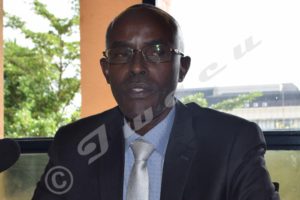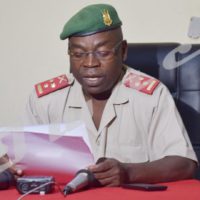Tutsi minorities were not sufficiently represented in inter-Burundian dialogue rounds held in Arusha, according to a member of UPRONA party, the wing not recognized by Burundi government. He asked the Facilitator in the Burundi conflict to enhance the representation of Tutsi in the next dialogue rounds.

Tatien Sibomana: “Why are Tutsi former Vice-President and the Speaker of National Assembly not invited?”
«We expressed our concern to the facilitation office asking it to enhance the representation of the Tutsi minority in the next dialogue rounds. We noticed that Tutsi were not sufficiently represented, “says Tatien Sibomana.
On 24 January, members of the executive committee of UPRONA party, the wing not recognized by the Government, sent a letter to William Benjamin Mkapa , facilitator in the Burundi conflict asking him to increase the number of Tutsi representatives in the next rounds of the inter-Burundian dialogue process in Arusha.
Sibomana says the Arusha Peace and Reconciliation Agreement is based on the politico-ethnic power-sharing.” Hence, the need to respect the ethnic balance in highly sensitive institutions such as the defense and security forces, the intelligence services and the implementation of law differentiating political and technical posts to avoid the exclusion of any ethnic group, “he says.
During the negotiations of the Arusha Peace and Reconciliation Agreement, there were two main groups: G7 made of seven political parties predominantly composed of Hutu and G10 dominated by Tutsi. UPRONA was the representative of G10 as the Frodebu party represented G7. “Now, the Arusha Peace Agreement is being violated, it would be incomprehensible that UPRONA abandons its mission to defend the interests of this minority. That is why, as G10 representative, we have an obligation to defend Tutsi,” Sibomana says.
He says the majority of Tutsi who are invited to this dialogue are mostly members of the organizations and political parties allied to the ruling party CNDD-FDD. “They do not even have the right to defend their brothers. They are there to defend the ruling party’s interests,” says Sibomana.
He says that there are former Hutu leaders who are invited to the dialogue such as the former Heads of State, Domitien Ndayizeye and Sylvestre Ntibantunganya. There is also Rufyikiri Gervais who was invited as former Vice-president and Speaker of the Burundi Senate. There is also Pie Ntavyohanyuma Pie who is a former Speaker of the National Assembly. They are all invited on the basis of their former status. “Why are Tutsi former Vice-President and the Speaker of National Assembly not invited? But they can help resolve the current crisis in the country, “says Sibomana.
He says the chairperson of an association called the Association of Victims of the 1972 crisis, living in Canada is invited to the dialogue. One wonders why AC Genocide ‘Cirimoso’ an association fighting against genocide in general is not invited.
On the other hand, Jean de Dieu Mutabazi, the Chairperson of RADEBU political party, says that the number of Tutsi invited to the inter-Burundian dialogue sessions is greater than the number of Hutu.
“25 out of 40 political parties approved in Burundi participating in the inter-Burundian dialogue are represented by Tutsi,” Mutabazi said.















 IWACU Open Data
IWACU Open Data

